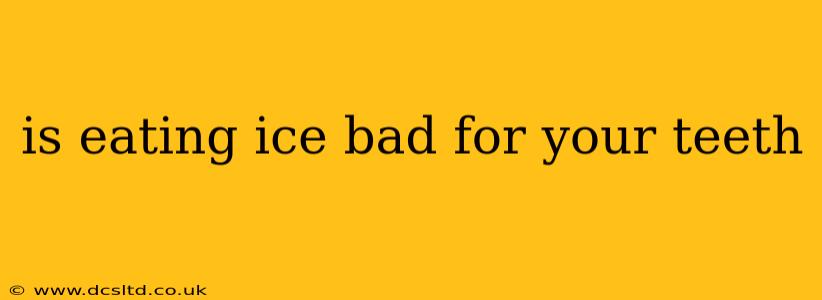The simple act of enjoying a refreshing ice cube might seem harmless, but is eating ice bad for your teeth? The answer, unfortunately, isn't a simple yes or no. While occasional ice chewing isn't likely to cause significant damage, habitual or forceful ice-chewing can lead to several dental problems. This article delves into the potential risks and offers advice on how to enjoy ice safely.
What Happens When You Chew Ice?
The primary concern with chewing ice is its hardness. Teeth are strong, but they aren't indestructible. When you bite down on ice, you're subjecting your enamel—the hard outer layer of your teeth—to significant force and pressure. This can lead to:
- Cracked or chipped teeth: The most immediate risk is physical damage to the enamel, causing cracks or chips. These imperfections can be unsightly and make your teeth more susceptible to cavities and decay.
- Worn enamel: Over time, repeated chewing of ice can lead to gradual enamel erosion. This makes your teeth more sensitive to temperature changes and sweet, acidic, or sour foods. The loss of enamel is irreversible, highlighting the importance of prevention.
- Increased sensitivity: As the protective enamel wears away, the underlying dentin—a softer layer—becomes exposed. Dentin is much more sensitive to stimuli, resulting in painful sensations when consuming hot or cold foods and drinks.
Can Ice Cause Cavities?
While ice itself doesn't directly cause cavities, the damage it inflicts on your teeth creates an environment where cavities are more likely to form. Cracks and chips provide spaces where food particles and bacteria can get trapped, increasing the risk of decay. Furthermore, the enamel erosion resulting from ice chewing exposes more of the tooth's surface to bacterial attack.
How Much Ice is Too Much?
There's no magic number, but consider these factors:
- Frequency: Occasional indulgence is generally fine. However, frequent ice chewing is where the risks escalate.
- Force: Gently crunching on ice is less damaging than forcefully biting down on large chunks.
- Underlying dental conditions: Individuals with existing dental problems, such as weakened enamel or cracked teeth, are at a higher risk of damage from ice chewing.
What are the Long-Term Effects of Chewing Ice?
The long-term effects of habitual ice chewing can be severe. Untreated enamel erosion and cracked teeth can lead to more extensive dental work, including fillings, crowns, root canals, and even tooth extraction. These procedures are costly and can be painful.
Is it Bad to Chew Ice if You Have Braces?
Yes, chewing ice is especially detrimental if you have braces. The hard ice can damage the brackets and wires of your braces, leading to costly repairs or even requiring replacement. It can also increase the risk of damage to your teeth.
How Can I Satisfy My Craving for Ice Safely?
If you have a strong urge to chew ice, try these alternatives:
- Frozen fruit: Many fruits, like grapes and berries, freeze well and provide a satisfying crunch without the risk of damaging your teeth.
- Ice chips: Smaller ice chips are less likely to cause damage than large cubes.
- Sugar-free popsicles: These provide a refreshing cool sensation without the enamel-eroding effects of sugar.
Conclusion
While the occasional ice cube won't likely ruin your teeth, habitual and forceful chewing of ice presents significant risks. Protecting your enamel is crucial for long-term dental health. If you're concerned about your ice-chewing habit or have any existing dental issues, consult your dentist. They can assess your situation and provide personalized advice. Remember, prioritizing dental health now can prevent costly and painful problems down the line.
